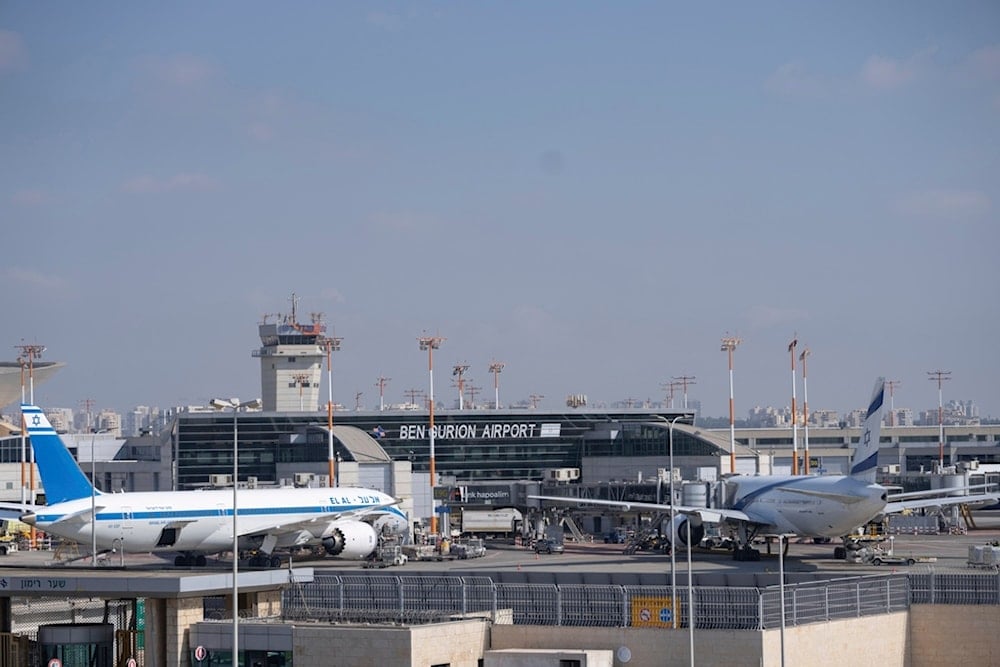Israeli aggression on Iran shut regional airspace, flights canceled
Israeli strikes on Iran prompt airspace closures in Iran, Iraq, and Jordan, forcing airlines to re-route or cancel flights amid rising regional risks.
-

Airplanes wait in the taxi area of the Ben Gurion Airport in the occupied Palestinian territories in this undated photo (AP)
A wave of flight cancellations and diversions swept through the Middle East on Friday after the Israeli occupation launched strikes on Iran, triggering widespread airspace closures in Iran, Iraq, and Jordan. The fallout from the Israeli attacks has severely disrupted civil aviation, with major airlines diverting or grounding flights to protect passengers and crew.
The strikes, which "Israel" claimed targeted Iranian nuclear sites and military infrastructure, prompted Iran to shut its airspace until further notice.
Iraq and Jordan followed suit, closing their skies to all air traffic amid fears of retaliation or miscalculation in the increasingly militarized region.
Data from Flightradar24 revealed a sharp rerouting of flights out of Iranian, Iraqi, and Jordanian airspace on Friday morning. The abrupt closures affected some of the busiest air corridors linking Asia, Europe, and the Gulf, forcing airlines to divert over Central Asia and Saudi Arabia.
Airlines, including Air India, Emirates, and Lufthansa, were among those affected. Flights between Europe and North America that typically overfly Iran were diverted or forced to return to their departure cities.
Air India confirmed that services from New York, Vancouver, Chicago, and London had been rerouted or cancelled in response to "Israel's" strike on Iran.
Flights cancelled, re-routed
Several international and regional airlines have suspended or re-routed flights in response to heightened security risks following the strikes, with the following list of the affected carriers and their announced changes as of June 13:
- Aegean Airlines suspended all flights to and from Tel Aviv for June 13
- Russian airliner Aeroflot said it canceled flights between Moscow and Tehran and is making changes to other routes in the Middle East
- Qatar Airways says flights canceled to/from Iraq and Iran
- Lufthansa: Iranian, Iraqi, and Israeli airspace will also not be used for overflights for the time being
- Emirates Airlines said flight cancellations to/from Iraq, Jordan, Lebanon, and Iran
- Turkey's AJet canceled flights to Iran, Iraq, Jordan
- Turkish Airlines THYAO.IS subsidiary AJet cancelled flights to Iran, Iraq, and Jordan until Monday morning
- Air France said it was suspending its flights to and from Tel Aviv "until further notice"
Meanwhile, Israeli airlines El Al, Israir, and Arkia said they were moving their planes out of “Israel”.
The planes were flown without passengers, said a spokesperson for Tel Aviv’s Ben Gurion Airport, which on Friday closed until further notice.
El Al said it is moving aircraft out of Israel “to our destinations,” and Arkia declined to say where they were moving.
Flight tracking data show a number of planes leaving Tel Aviv.
Ben Gurion Airport shut, regional carriers suspend operations
The Israeli regime shut down Tel Aviv’s Ben Gurion Airport, placing air defense units on high alert. Israeli flag carrier El Al suspended all services to and from the occupied territories until further notice.
Iranian authorities confirmed that all civilian aviation within Iranian airspace had been halted. Iraq also suspended operations at all its airports early Friday, citing safety concerns. Eastern Iraq, bordering Iran, is a vital flight path, hosting dozens of commercial jets in transit between Europe and the Gulf at any given time.
Jordan, sandwiched between Iraq and the Israeli occupation, followed by closing its airspace several hours after the strikes began.
As reports of the Israeli occupation’s airstrikes on Iran broke, multiple airlines flying over Iranian airspace at the time, such as Emirates, Lufthansa, and Air India, began immediate course changes.
Air India, in particular, was heavily impacted, with long-haul flights redirected or returned mid-journey. Lufthansa and Emirates did not issue immediate statements, though flight tracking showed numerous diversions in progress.
Flydubai suspended flights to Amman, Beirut, Damascus, Iran, and occupied Palestine, while re-routing others or returning planes to their point of origin. Qatar Airways also canceled its scheduled flights to Damascus.
Several Dubai-bound flights were forced to land in alternative cities, including Istanbul and Yerevan, due to restricted airspace access.
Expanding conflict zones threaten aviation safety and profit
Aviation risk consultancy Osprey Flight Solutions warned that proliferating conflict zones are posing an increasing burden on airline operations and profitability. The region’s skies have been under strain since October 2023, when the Israeli occupation’s brutal genocide on Gaza introduced frequent missile and drone activity into shared airspace.
"The situation is still emerging, operators should use a high degree of caution in the region at this time," stated Safe Airspace, a service by OPSGROUP that tracks high-risk flight zones.
According to Osprey, six commercial aircraft have been shot down unintentionally since 2001, with three near-misses recorded. Notable incidents include the downing of Malaysia Airlines MH17 over eastern Ukraine in 2014.
Last year alone, commercial planes were downed in Kazakhstan and Sudan, further underscoring the risks. Eurocontrol data reveals that Middle Eastern airspace typically hosts over 1,400 flights per day between Europe and the Gulf, meaning any new closures or reroutes threaten major disruptions.
As the Israeli occupation’s aggression against Iran continues, regional skies have become another frontline, one where civilian flights now compete with unpredictable military escalation.

 5 Min Read
5 Min Read









